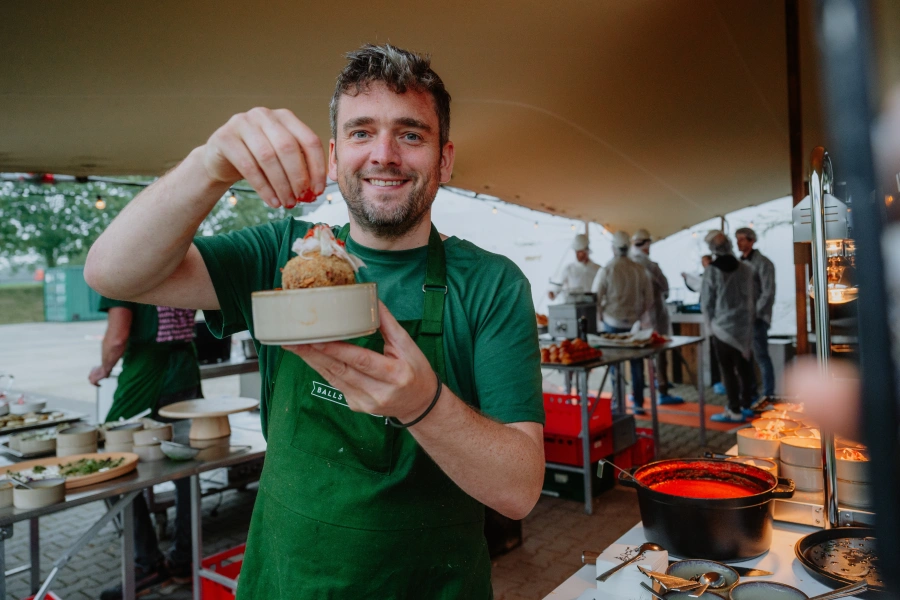As the most active investor in startups, we are daily engaged in the intricacies of the regional economy. We maintain active contact with innovative companies that will make a difference in the future. We actively build ecosystems within which companies can excel and guide Brabant companies to foreign growth markets and vice versa. More and more often, we hear from entrepreneurs that they encounter bottlenecks that hinder them in their growth ambitions. The urgent calls are becoming louder.
During several recent company visits to the Scale-Up Plant of Europe*, these bottlenecks in the innovation ecosystem were brought to the forefront. In this case, specifically for the plant-based sector, but they are illustrative of many innovative companies in other sectors. We list them.
Energy
A challenge for all companies. If a new connection or expansion to the power grid is even possible, it immediately creates a new problem: the prices! Energy prices for heating boilers or running their machine park fluctuate constantly. Creating a viable business case and maintaining consistent operations is thus virtually impossible and results in a situation where the same business case, for example, in Berlin yields 7 to 8 percent more profit. Regulation in the form of, for example, a price cap or guarantee subsidies for innovative entrepreneurs is an indispensable and feasible solution.
Laws and regulations
Registration of novel food in the EU is expensive, slow, and unpredictable. For example, a company like Protix is currently unable to use certain low-value food waste streams as a basis for animal feed, while this is done outside Europe. This hinders entrepreneurship. Companies are often forced to focus on the US and Asia at an early stage because market access is much easier there. It's fine for companies to produce on a commercial scale outside the Netherlands, but the scalability that precedes this fits seamlessly into the Brabant ecosystem (Scale-Up Plant of Europe). Procedures within the EU need to be simpler, more transparent, faster, and cheaper. Something also endorsed by The Protein Brewery. As a leading agro-country, the Netherlands should advocate more strongly for this within the EU.
Financing
Plant-based food ingredients form a capital-intensive industry. This is mainly due to the high costs of machinery and installations. Here, costs precede benefits. To achieve this with little to no revenue, a public fund could provide a solution. FoodValley previously calculated that with a relatively modest public impulse of 200 million euros, risks for these companies and investors could be covered, making private parties more inclined to step in. This leverage is already frequently applied in surrounding countries such as France and Germany.
Additionally, the speed of decision-making for financing in the Netherlands should be increased, as brought up by PeelPioneers. A 'yes' is good, but a 'no' can be too, as long as it comes faster, enabling better adaptation.
Talent
The plant-based market cannot do without foreign talent. According to Revyve, a Dutch operator is hard to find and usually comes from another European country or even further abroad. Hindering factors such as the limited pool of talent graduating from Dutch institutions, high labor costs, or overly restrictive immigration policies have a direct impact on the success of the plant-based sector. Given the impact and size of this sector, it should be considered vital for the Netherlands, legitimizing an exceptional position.
Market
The market for meat substitutes is barely growing, stalling at around a modest 5 percent. The alternative; hybrid meat, where, for example, 20% of the meat is replaced by plant-based ingredients without compromising on taste, significantly increases the impact and market opportunities for plant-based products and thus for the respective startups. At Protix, this led to an interesting option: the implementation of a sustainability standard, like that applied for adding sustainable aviation fuel to kerosene in the aviation sector, could greatly accelerate the food transition. Such a standard attracts investors to pioneers in sustainability. A similar sustainability standard could also be implemented for animal feed, resulting in increasingly sustainable alternative proteins and fats for animal feed. That can make a significant contribution to achieving the EU's sustainability ambitions. It also makes it more attractive for private parties to invest in young, sustainable, and innovative producers of raw materials. Cosun expects that a rapidly growing market for hybrid meat can lead to a shift in consumption from 40-60 to 60-40 plant-based versus animal proteins.
Focus on sustainable green growth
Some of these bottlenecks relate to laws and regulations, others to a lack of space or, again, more uncertainties around energy rates. While the hick-ups differ, the outcome is often the same. Innovative companies look across borders and leave the Netherlands and not infrequently Europe. Recently, a number of economists united in Advocates for the Future pointed out to politicians the importance of focus. They see room for a sustainable green economy as future-proof.
At this moment, these innovative sectors are losing out. A shame for a region with excellent credentials for companies that want to scale commercially in the food sector. To maintain this future engine of our earning capacity, BOM is committed, along with the Province of North Brabant, REWIN West Brabant, and its stakeholders, within the Scale-Up Plant of Europe, to giving innovative food companies ample opportunity to scale up. Who thinks and acts to retain these innovations for Brabant?
* With the Scale-Up Plant of Europe, the region builds a plant-based ecosystem where entrepreneurs have access to the right resources, expertise, and networks. This accelerates the transition to sustainable food and strengthens Brabant as an international leader in plant-based innovation.
Learn more?


